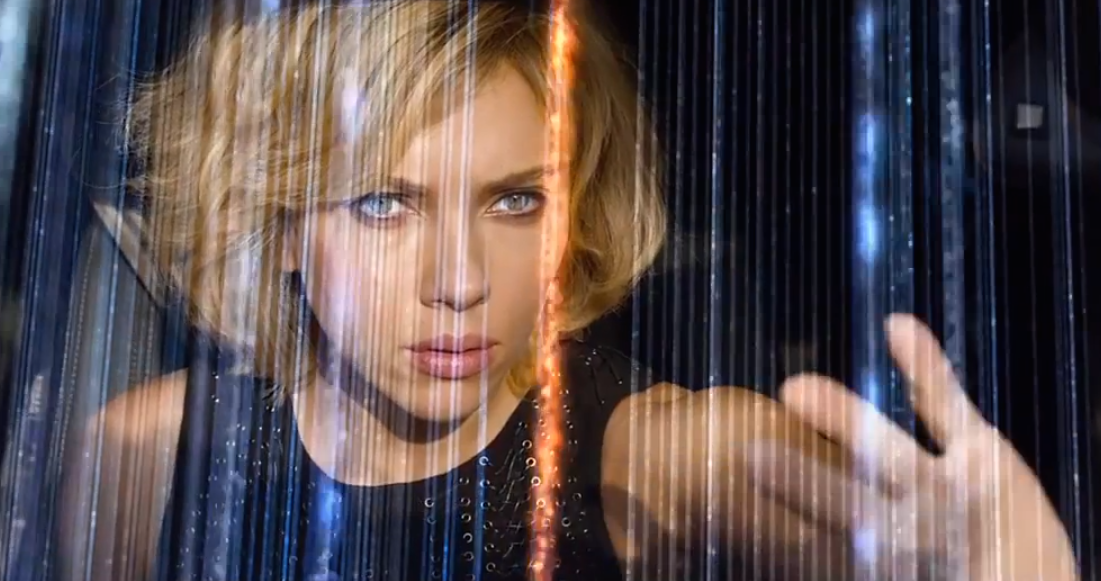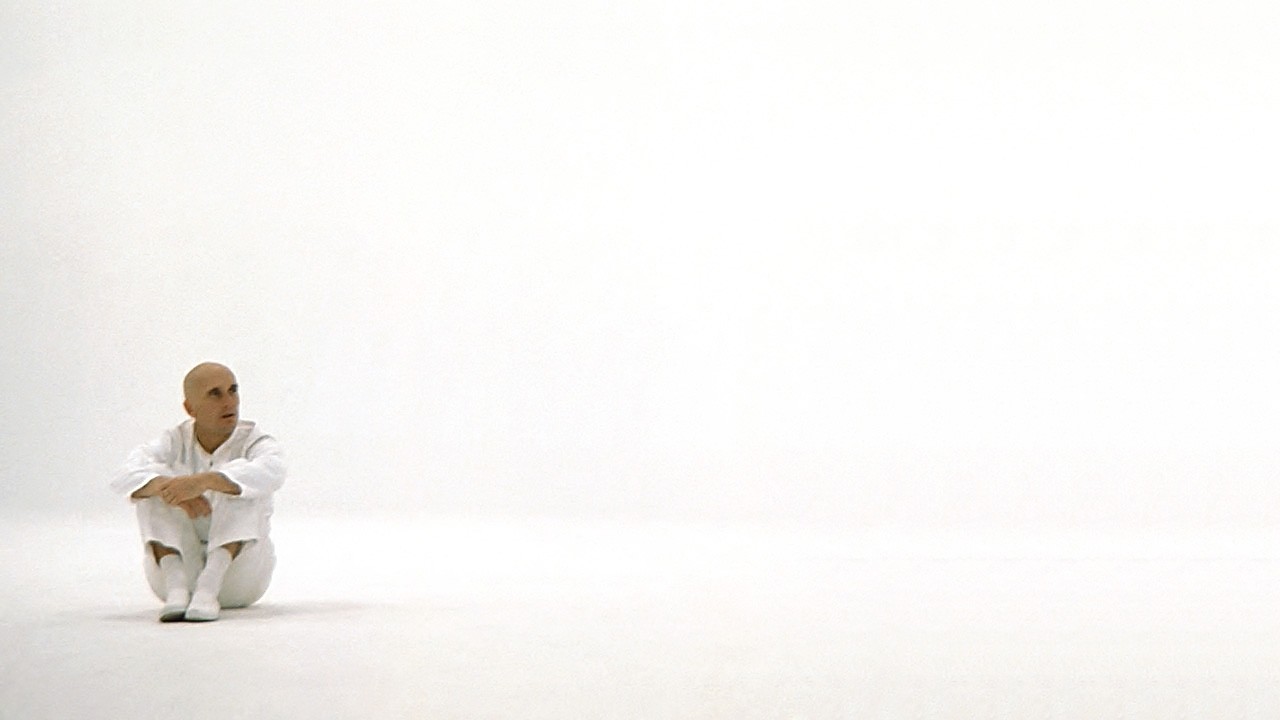#453 - Lucy
Luc Besson, 2014

A young woman who is forced to become a drug mule starts to absorb the brand-new drug she's carrying and it turns her into a hyper-intelligent superhuman.
In the past, I have bought into some admittedly ludicrous science-fiction premises for the sake of good action sequences (most notably Equilibrium building a world where becoming an efficient marksman can be reduced to a martial-arts discipline rooted in complex mathematics), but these days I'm not likely to forgive such a premise since they're just too damn ridiculous for their own good (case in point - Wanted). Lucy takes things to an especially absurd level by taking a long-debunked myth (namely, that since humans only use about 10% of their brain's potential then what would happen if we could use the whole 100%?) and uses it to build an incredibly soft science-fiction premise that allows for its eponymous protagonist (Scarlett Johansson) to go from hapless everywoman to a superpowered freak of nature.
Of course, to get there first the film spends its first third setting up Johansson as an unwitting victim of a Taiwanese mob (led by Choi Min-sik), who have plans to smuggle several packs of a brand-new recreational drug out of the country by using Johansson and a few others as mules who get the packs surgically inserted into their abdomens. Of course, thanks to the extremely implausible plot development where Johansson is kicked in the stomach by one of Choi's subordinates (who you'd think would know about the whole drug mule situation and would, y'know, not kick a drug-mule in the part of her body that was carrying a pack of drugs), the pack breaks and leaks the drug directly into her system, which causes her to start unlocking her genetic potential and before long she escapes and starts to go on a journey that initially seems to be about revenge against her captors but soon develops into something far greater than something as petty as vengeance. This, of course, means enlisting the help of a professor of scientific theory (Morgan Freeman, who helpfully spends a sizable chunk of his screentime providing us with exposition and undesirable flashbacks to Wanted) and a French detective (Amr Waked), even though Choi and his gang are in relentless pursuit.
The problem with Lucy isn't so much the bogus science that gives it its premise (though that does beggar some considerable belief) so much as...well, everything else. Johansson's rapidly evolving state of consciousness means that she soon evolves into a Dr. Manhattan-like humanoid who loses her empathy for humans to the point where she has no problem shooting and running over innocent bystanders yet will conspicuously leave most of the film's actual villains alive, (mostly) unharmed, and free to come back and attack her later because this film needs to generate conflict somehow. Speaking of conflict, the fact that Johansson's abilities include not just increased power and intelligence but also the increased power to manipulate the people and world around her also sucks any real tension out of the conflict as she can work her way out of every situation (and it's not like Freeman and Waked being endangered as a result of the plot makes for much in the way of stakes due to their sheer lack of characterisation). This lack of tension is very much present in the climax, which draws inspiration from a handful of different movies (including Besson's own Léon) but fails to make anything impressive out of it.
Lucy drew some ire when it first came out due to not only its scientifically ridiculous plot catalyst plus its somewhat racist overtones (almost every villain in the film is Asian, the token white villain never suffers any comeuppance, the white American protagonist non-fatally shoots an innocent Asian taxi driver simply for not knowing how to speak English, etc. in ways that not even the casting of Freeman and Waked as heroes can compensate for), but now that I've actually seen the film it's easy to see that it's quite simply a horrible film in general. The premise serves as a launching pad for an incredibly hollow and low-stakes film as Johansson gets progressively more powerful and is only as competent or incompetent as she needs to be in order to pad the film out to 90 minutes. It gets to the point where even attempts to add some emotional resonance to the film (such as Johansson's tearful phone call to her mother before she evolves beyond human sentiment completely) come across as failures at best. Lucy in general comes across as a failure at best where bad science ends up being the least of the film's problems and the action sequences aren't remotely good enough to justify the rest of the film's existence.
Luc Besson, 2014

A young woman who is forced to become a drug mule starts to absorb the brand-new drug she's carrying and it turns her into a hyper-intelligent superhuman.
In the past, I have bought into some admittedly ludicrous science-fiction premises for the sake of good action sequences (most notably Equilibrium building a world where becoming an efficient marksman can be reduced to a martial-arts discipline rooted in complex mathematics), but these days I'm not likely to forgive such a premise since they're just too damn ridiculous for their own good (case in point - Wanted). Lucy takes things to an especially absurd level by taking a long-debunked myth (namely, that since humans only use about 10% of their brain's potential then what would happen if we could use the whole 100%?) and uses it to build an incredibly soft science-fiction premise that allows for its eponymous protagonist (Scarlett Johansson) to go from hapless everywoman to a superpowered freak of nature.
Of course, to get there first the film spends its first third setting up Johansson as an unwitting victim of a Taiwanese mob (led by Choi Min-sik), who have plans to smuggle several packs of a brand-new recreational drug out of the country by using Johansson and a few others as mules who get the packs surgically inserted into their abdomens. Of course, thanks to the extremely implausible plot development where Johansson is kicked in the stomach by one of Choi's subordinates (who you'd think would know about the whole drug mule situation and would, y'know, not kick a drug-mule in the part of her body that was carrying a pack of drugs), the pack breaks and leaks the drug directly into her system, which causes her to start unlocking her genetic potential and before long she escapes and starts to go on a journey that initially seems to be about revenge against her captors but soon develops into something far greater than something as petty as vengeance. This, of course, means enlisting the help of a professor of scientific theory (Morgan Freeman, who helpfully spends a sizable chunk of his screentime providing us with exposition and undesirable flashbacks to Wanted) and a French detective (Amr Waked), even though Choi and his gang are in relentless pursuit.
The problem with Lucy isn't so much the bogus science that gives it its premise (though that does beggar some considerable belief) so much as...well, everything else. Johansson's rapidly evolving state of consciousness means that she soon evolves into a Dr. Manhattan-like humanoid who loses her empathy for humans to the point where she has no problem shooting and running over innocent bystanders yet will conspicuously leave most of the film's actual villains alive, (mostly) unharmed, and free to come back and attack her later because this film needs to generate conflict somehow. Speaking of conflict, the fact that Johansson's abilities include not just increased power and intelligence but also the increased power to manipulate the people and world around her also sucks any real tension out of the conflict as she can work her way out of every situation (and it's not like Freeman and Waked being endangered as a result of the plot makes for much in the way of stakes due to their sheer lack of characterisation). This lack of tension is very much present in the climax, which draws inspiration from a handful of different movies (including Besson's own Léon) but fails to make anything impressive out of it.
Lucy drew some ire when it first came out due to not only its scientifically ridiculous plot catalyst plus its somewhat racist overtones (almost every villain in the film is Asian, the token white villain never suffers any comeuppance, the white American protagonist non-fatally shoots an innocent Asian taxi driver simply for not knowing how to speak English, etc. in ways that not even the casting of Freeman and Waked as heroes can compensate for), but now that I've actually seen the film it's easy to see that it's quite simply a horrible film in general. The premise serves as a launching pad for an incredibly hollow and low-stakes film as Johansson gets progressively more powerful and is only as competent or incompetent as she needs to be in order to pad the film out to 90 minutes. It gets to the point where even attempts to add some emotional resonance to the film (such as Johansson's tearful phone call to her mother before she evolves beyond human sentiment completely) come across as failures at best. Lucy in general comes across as a failure at best where bad science ends up being the least of the film's problems and the action sequences aren't remotely good enough to justify the rest of the film's existence.
__________________
Iro's Top 100 Movies v3.0
I really just want you all angry and confused the whole time.







 .
.